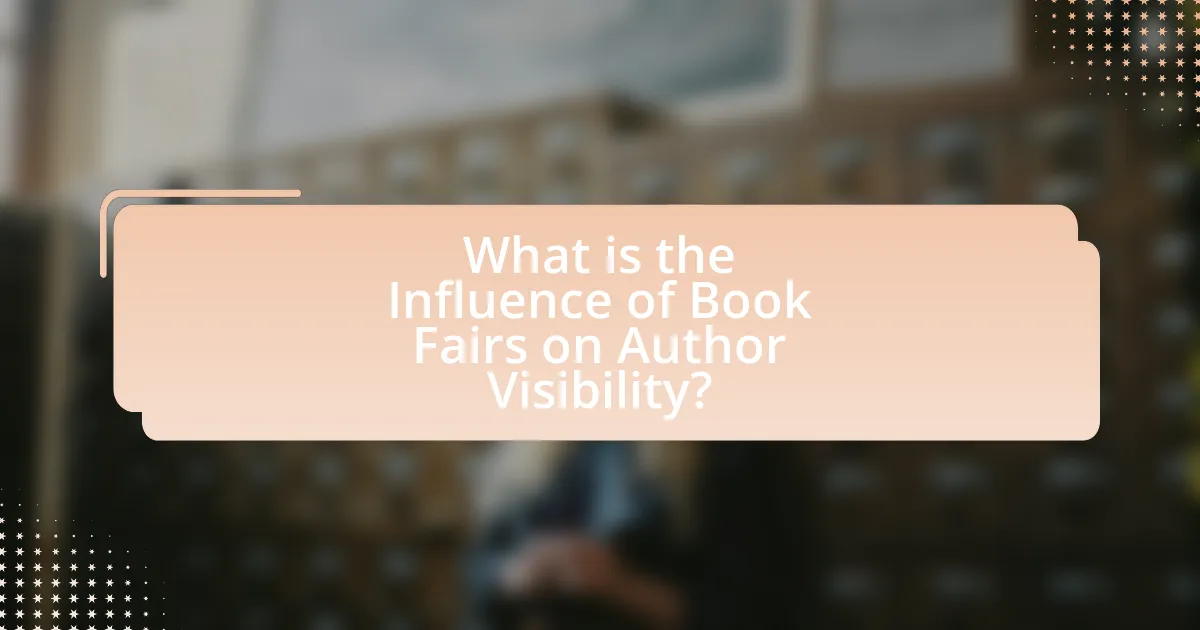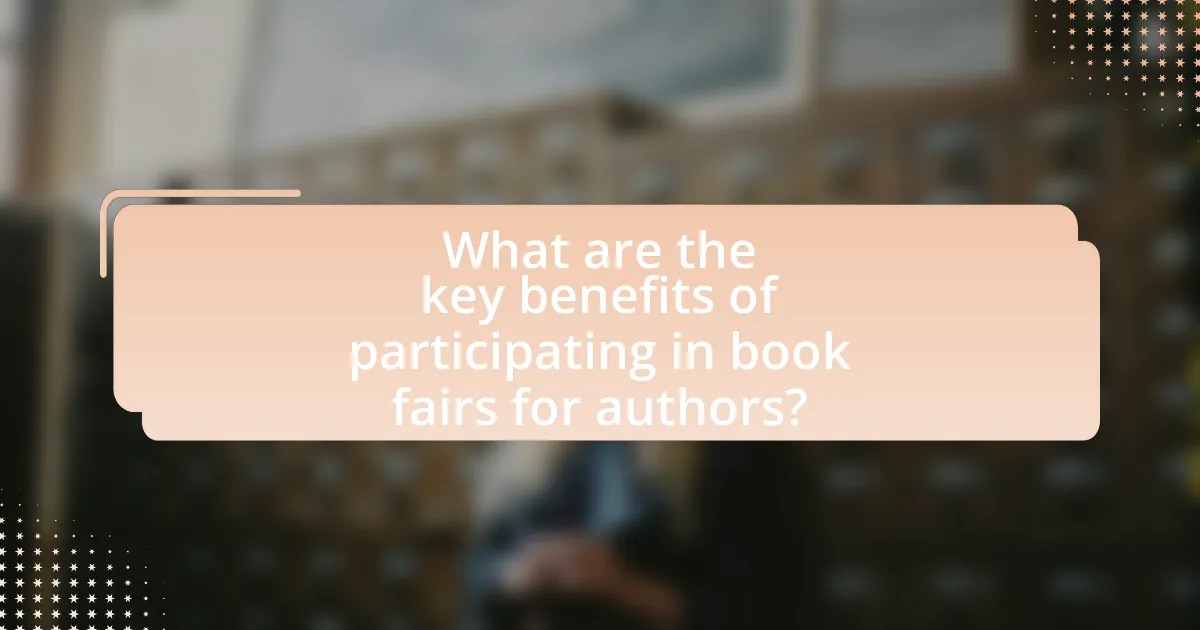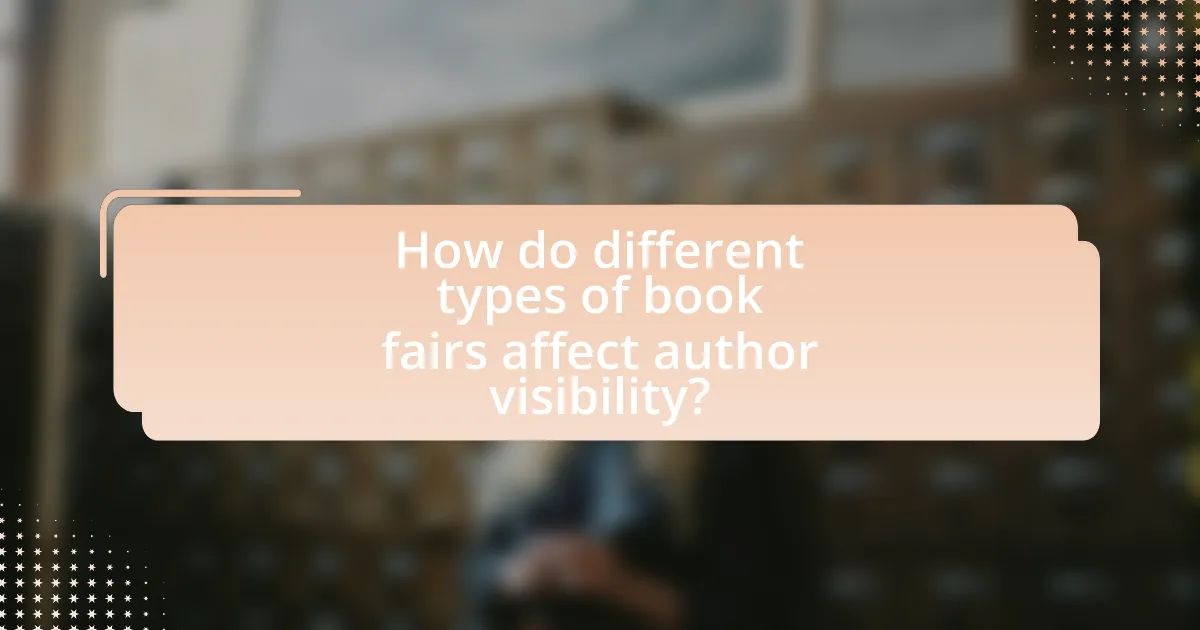The article examines the significant influence of book fairs on author visibility, highlighting how these events provide essential platforms for direct interaction with readers, publishers, and industry professionals. It details the benefits of participating in book fairs, such as increased sales, networking opportunities, and enhanced media exposure. The article also explores the impact of location, event type, and strategic engagement on author visibility, emphasizing the importance of preparation and follow-up strategies to maintain connections made during these events. Overall, it underscores the critical role book fairs play in promoting authors and expanding their reach within the literary community.

What is the Influence of Book Fairs on Author Visibility?
Book fairs significantly enhance author visibility by providing a platform for direct interaction with readers, publishers, and industry professionals. These events attract large audiences, allowing authors to showcase their work, participate in discussions, and engage in book signings, which can lead to increased sales and recognition. For instance, the Frankfurt Book Fair, one of the largest in the world, hosts thousands of exhibitors and attracts over 300,000 visitors annually, creating substantial networking opportunities for authors. Additionally, studies indicate that authors who participate in book fairs often experience a boost in social media following and media coverage, further amplifying their visibility in the literary market.
How do book fairs enhance the visibility of authors?
Book fairs enhance the visibility of authors by providing a platform for direct interaction with readers, publishers, and industry professionals. These events attract large audiences, allowing authors to showcase their work, participate in discussions, and engage in book signings, which increases their exposure. For instance, the Frankfurt Book Fair, one of the largest in the world, hosts over 7,000 exhibitors and attracts around 300,000 visitors annually, creating significant opportunities for authors to connect with potential fans and industry contacts. This direct engagement not only raises awareness of their books but also helps authors build their personal brand and network within the literary community.
What role do book fairs play in connecting authors with readers?
Book fairs serve as vital platforms for connecting authors with readers by facilitating direct interactions and promoting literary works. These events allow authors to showcase their books, engage in discussions, and participate in signings, which enhances visibility and fosters relationships with potential readers. For instance, the Frankfurt Book Fair, one of the largest in the world, attracts thousands of attendees, providing authors with opportunities to reach diverse audiences and gain immediate feedback on their work. This direct engagement not only increases book sales but also helps authors build a loyal readership, as evidenced by the significant number of authors who report increased visibility and sales following their participation in such events.
How do book fairs facilitate networking opportunities for authors?
Book fairs facilitate networking opportunities for authors by providing a centralized venue where they can connect with industry professionals, publishers, and fellow writers. These events often feature panels, workshops, and social gatherings that encourage interaction and collaboration among attendees. For instance, the Frankfurt Book Fair, one of the largest in the world, attracts thousands of authors and industry stakeholders, fostering relationships that can lead to publishing deals and collaborative projects. Additionally, authors can engage in discussions about trends and challenges in the literary market, enhancing their visibility and professional network.
What factors contribute to the effectiveness of book fairs in promoting authors?
Book fairs effectively promote authors due to factors such as networking opportunities, direct audience engagement, and media exposure. Networking opportunities allow authors to connect with publishers, agents, and fellow writers, facilitating collaborations and enhancing their visibility in the literary community. Direct audience engagement occurs as authors interact with readers, providing them with a personal connection that can lead to increased book sales and a loyal fan base. Media exposure is significant, as book fairs often attract journalists and bloggers, resulting in coverage that can amplify an author’s reach. For instance, the Frankfurt Book Fair, one of the largest in the world, showcases thousands of authors and generates extensive media attention, demonstrating how such events can elevate an author’s profile.
How does the location of a book fair impact author visibility?
The location of a book fair significantly impacts author visibility by determining the audience size and demographic engagement. For instance, book fairs held in major metropolitan areas attract larger crowds and diverse attendees, enhancing the chances for authors to connect with potential readers, publishers, and industry professionals. Research indicates that events in cities like New York or London can draw thousands of visitors, compared to smaller fairs in rural areas, which may limit exposure. Additionally, proximity to literary hubs increases media coverage and networking opportunities, further amplifying an author’s presence in the literary community.
What types of events within book fairs are most beneficial for authors?
Author panels and book signings are the most beneficial events within book fairs for authors. These events provide authors with direct interaction opportunities with readers, allowing them to showcase their work and engage in discussions about their books. According to a study by the Association of American Publishers, author participation in panels can increase book sales by up to 30%, as it enhances visibility and fosters a personal connection with potential readers. Additionally, networking events at book fairs facilitate relationships with industry professionals, which can lead to future publishing opportunities and collaborations.

What are the key benefits of participating in book fairs for authors?
Participating in book fairs provides authors with significant benefits, including increased visibility, networking opportunities, and potential sales. Increased visibility occurs as authors showcase their work to a diverse audience, including readers, publishers, and industry professionals, which can lead to greater recognition in the literary community. Networking opportunities arise as authors connect with other writers, agents, and publishers, facilitating collaborations and future publishing deals. Additionally, book fairs often result in direct sales, allowing authors to sell their books on-site and engage with readers, which can enhance their market presence. These benefits collectively contribute to an author’s career growth and success in the competitive publishing landscape.
How do book fairs help authors reach new audiences?
Book fairs help authors reach new audiences by providing a platform for direct interaction with potential readers and industry professionals. These events attract diverse attendees, including book lovers, publishers, and literary agents, allowing authors to showcase their work and engage in discussions. For instance, the Frankfurt Book Fair, one of the largest in the world, draws over 300,000 visitors annually, creating significant opportunities for authors to connect with a broad audience. Additionally, authors can participate in panels, signings, and networking events, further enhancing their visibility and expanding their reach within the literary community.
What strategies can authors use to maximize their exposure at book fairs?
Authors can maximize their exposure at book fairs by actively engaging with attendees, utilizing social media for promotion, and hosting events or signings. Engaging with attendees through conversations and networking can create personal connections that enhance visibility. Utilizing social media platforms before, during, and after the event allows authors to reach a broader audience, as studies show that social media can increase event attendance by up to 30%. Hosting events or signings at the fair attracts more visitors to their booth, as authors who participate in scheduled activities often see a 50% increase in foot traffic compared to those who do not.
How do book fairs influence book sales for participating authors?
Book fairs significantly enhance book sales for participating authors by providing direct access to a large audience of potential readers and industry professionals. These events create opportunities for authors to showcase their work, engage with readers, and network with publishers and agents. For instance, a study by the Association of American Publishers found that authors who participate in book fairs often see a sales increase of 20% to 30% following the event due to heightened visibility and promotional activities. Additionally, authors can leverage the media coverage and social media buzz generated during these fairs to further boost their sales post-event.
What promotional opportunities do book fairs provide for authors?
Book fairs provide authors with significant promotional opportunities, including direct access to a large audience, networking with industry professionals, and the chance to showcase their work. These events attract thousands of attendees, including readers, publishers, and literary agents, allowing authors to engage with potential fans and industry contacts directly. For instance, the Frankfurt Book Fair, one of the largest in the world, hosts over 300,000 visitors annually, creating a substantial platform for authors to gain visibility. Additionally, authors can participate in panel discussions, book signings, and readings, further enhancing their exposure and credibility within the literary community.
How can authors leverage social media during book fairs for increased visibility?
Authors can leverage social media during book fairs by actively engaging with their audience, sharing live updates, and utilizing targeted hashtags. Engaging with followers through posts and stories can create real-time interaction, fostering a sense of community and excitement around their work. Sharing live updates about their location, book signings, or panel discussions can attract attendees to their booth, increasing foot traffic and visibility. Using targeted hashtags related to the book fair can enhance discoverability, as potential readers and industry professionals often search for these tags to find relevant content. According to a study by the Pew Research Center, 69% of adults in the U.S. use social media, indicating a significant audience that authors can reach through these platforms.
What partnerships can authors form at book fairs to enhance their reach?
Authors can form partnerships with publishers, literary agents, and fellow authors at book fairs to enhance their reach. Collaborating with publishers allows authors to gain access to broader distribution channels and marketing resources, while partnerships with literary agents can provide valuable networking opportunities and industry insights. Additionally, co-hosting events or panel discussions with fellow authors can attract larger audiences, fostering cross-promotion and shared visibility. These partnerships leverage the collective strengths of each party, ultimately increasing an author’s exposure and potential readership.

How do different types of book fairs affect author visibility?
Different types of book fairs significantly affect author visibility by providing varied platforms for exposure and networking opportunities. Trade fairs, such as the Frankfurt Book Fair, attract industry professionals, allowing authors to connect with publishers and agents, which can lead to increased visibility in the market. In contrast, public book fairs, like the Los Angeles Times Festival of Books, engage a broader audience, enabling authors to reach potential readers directly, thereby enhancing their public profile. Research indicates that participation in these events can lead to a 30% increase in book sales for authors, demonstrating the tangible impact of book fairs on visibility.
What distinguishes trade book fairs from public book fairs in terms of author exposure?
Trade book fairs primarily focus on industry professionals, which limits author exposure to a select audience of publishers, agents, and booksellers, while public book fairs cater to a broader audience, allowing authors to engage directly with readers. At trade book fairs, authors often participate in panels or networking events that are less accessible to the general public, resulting in fewer opportunities for direct reader interaction. In contrast, public book fairs provide authors with platforms for book signings, readings, and discussions, significantly enhancing their visibility among potential readers. This distinction is evident in events like the Frankfurt Book Fair, which is primarily trade-focused, versus the Los Angeles Times Festival of Books, which emphasizes public engagement.
How do genre-specific book fairs cater to niche audiences for authors?
Genre-specific book fairs cater to niche audiences for authors by providing targeted platforms that connect writers with readers who have specific interests. These events focus on particular genres, such as science fiction, romance, or mystery, allowing authors to showcase their work directly to an audience that is already engaged and passionate about that genre. For instance, the World Fantasy Convention attracts fantasy authors and fans, creating an environment where authors can network, promote their books, and participate in discussions relevant to their genre. This targeted approach enhances visibility for authors, as they can interact with potential readers who are more likely to appreciate and purchase their work, thereby increasing their chances of success in a competitive market.
What unique opportunities do international book fairs present for authors?
International book fairs present authors with unique opportunities for networking, exposure, and market access. These events allow authors to connect directly with publishers, agents, and readers, facilitating potential collaborations and representation. Additionally, authors can showcase their work to a global audience, increasing visibility and sales potential. For instance, the Frankfurt Book Fair, one of the largest in the world, attracts over 300,000 visitors annually, providing authors with a platform to promote their books and engage with industry professionals. This direct interaction can lead to translation deals, foreign rights sales, and invitations to speak at other literary events, further enhancing an author’s career prospects.
How can authors choose the right book fair to attend for maximum visibility?
Authors can choose the right book fair for maximum visibility by researching the fair’s audience demographics, industry relevance, and promotional opportunities. Selecting a fair that attracts their target readership increases the likelihood of engaging potential readers and industry professionals. For instance, the Frankfurt Book Fair, known for its international reach, attracts a diverse audience, making it ideal for authors seeking global visibility. Additionally, fairs that offer author panels, signings, and networking events provide platforms for authors to showcase their work and connect with publishers and agents, further enhancing their visibility.
What criteria should authors consider when selecting a book fair?
Authors should consider the target audience, location, reputation, and cost when selecting a book fair. The target audience is crucial as it determines the potential reach and engagement with readers who are likely to be interested in the author’s genre. The location impacts accessibility and foot traffic, which can enhance visibility. The reputation of the book fair influences the quality of networking opportunities and the likelihood of attracting media attention. Lastly, the cost must align with the author’s budget while considering potential return on investment through book sales and exposure. These criteria collectively ensure that authors maximize their visibility and opportunities at book fairs.
How can authors assess the potential impact of a book fair on their visibility?
Authors can assess the potential impact of a book fair on their visibility by analyzing attendance metrics, engagement opportunities, and post-event visibility indicators. Attendance metrics, such as the number of visitors and the demographics of attendees, provide insight into the audience reach. Engagement opportunities, including author panels, book signings, and networking events, allow authors to interact directly with potential readers and industry professionals, enhancing their visibility. Post-event visibility indicators, such as social media mentions, website traffic spikes, and sales data following the event, serve as concrete evidence of the fair’s impact. For instance, a study by the Association of American Publishers found that authors who participated in book fairs reported a 30% increase in social media engagement and a 20% increase in book sales within three months post-event, demonstrating a clear correlation between participation and visibility enhancement.
What are best practices for authors to enhance their visibility at book fairs?
Authors can enhance their visibility at book fairs by actively engaging with attendees through strategic networking, effective marketing materials, and interactive presentations. Networking allows authors to connect with industry professionals, potential readers, and other authors, increasing their exposure. Utilizing eye-catching marketing materials, such as banners, bookmarks, and business cards, helps to attract attention to their booth or signing area. Additionally, hosting interactive presentations or readings can draw in crowds and create memorable experiences, further promoting their work. These practices are supported by the fact that authors who engage directly with their audience often see increased book sales and a stronger fan base, as evidenced by surveys indicating that personal interactions at events significantly influence purchasing decisions.
How can authors prepare effectively for participation in book fairs?
Authors can prepare effectively for participation in book fairs by developing a strategic plan that includes setting clear goals, creating promotional materials, and engaging with attendees. Establishing specific objectives, such as increasing book sales or networking with industry professionals, helps authors focus their efforts. Additionally, authors should design eye-catching promotional materials, including bookmarks, business cards, and banners, to attract potential readers and collaborators. Engaging with attendees through interactive activities, such as book signings or readings, enhances visibility and fosters connections. Research indicates that authors who actively participate in discussions and networking opportunities at book fairs significantly increase their chances of gaining visibility and expanding their audience.
What follow-up strategies should authors implement after a book fair to maintain visibility?
Authors should implement targeted email campaigns to maintain visibility after a book fair. By sending personalized follow-up emails to contacts made during the event, authors can reinforce connections and remind potential readers of their work. Research indicates that personalized communication increases engagement rates by up to 29%, making it a vital strategy for authors looking to sustain interest in their books. Additionally, authors should leverage social media platforms to share highlights from the book fair, including photos and interactions, which can enhance their online presence and attract new followers. Engaging with attendees through social media can lead to a 20% increase in audience interaction, further solidifying their visibility in the literary community.